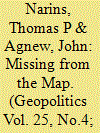|
|
|
Sort Order |
|
|
|
Items / Page
|
|
|
|
|
|
|
| Srl | Item |
| 1 |
ID:
131351


|
|
|
|
|
| Publication |
2014.
|
| Summary/Abstract |
In December 2006, Indonesian Health Minister, Siti Fadilah Supari, shocked the world when announcing her government would no longer be sharing samples of the H5N1 avian flu virus, collected from Indonesian patients, with the World Health Organization, at a time when global fears of a deadly influenza pandemic were running high. For observers of Southeast Asian politics, the decision reinforced the view of the region as made up of states determined to protect their national sovereignty, at almost all costs. This established view of the region, however, generally neglects the variable and selective manner in which sovereignty has been invoked by Southeast Asian governments, or parts thereof, and fails to identify the conditions shaping the deployment of sovereignty. In this paper, it is argued that Siti's action was designed to harness claims of sovereignty to a domestic political struggle. It was a response to the growing fragmentation and, in some cases, denationalisation of the governance apparatus dealing with public health in Indonesia, along with the 'securitisation' of H5N1 internationally. The examination of the virus-sharing dispute demonstrates that in Southeast Asia sovereignty is not so much the ends of government action, but the means utilised by government actors for advancing particular political goals.
|
|
|
|
|
|
|
|
|
|
|
|
|
|
|
|
| 2 |
ID:
172807


|
|
|
|
|
| Summary/Abstract |
Historical and conventional international relations (IR) frameworks describe the Belt Road Initiative (BRI) as representing a newly ambitious Chinese drive into global politics that positions China as moving away from its long-time reticence towards foreign entanglements. This raises a contradiction of China being at one and the same time both a defender of its own territorial sovereignty while also being engaged in various projects, particularly the BRI and the associated Asian Infrastructure Investment Bank (AIIB), that point in completely different directions. This paper seeks to build upon and move beyond conventional framings to understand how the BRI represents a conflict over the workings of state sovereignty that such frameworks have trouble addressing. We argue that the absence of an official Chinese government BRI map promotes a ‘useful fuzziness’ with regards to China being open to crafting a new as of yet undefined geopolitical identity. In light of the absence of such a map, this work considers key ideas relating to China’s geopolitical expansion via the BRI in terms of so-called sovereignty regimes – the idea that various practices of authority and control emanating originally from states take different geographical shapes. Conflicts arise when a state, such as China, finds itself caught between the operational imperatives of multiple regimes. By identifying the current sovereignty dynamics raised by the BRI in light of the relevant, yet distinctive historical experience of the Marshall Plan, this work can be used as a model for understanding how China’s current leadership is managing the debate of simultaneously protecting ‘strong borders’ yet also promoting a policy of ‘going out’.
|
|
|
|
|
|
|
|
|
|
|
|
|
|
|
|
|
|
|
|
|